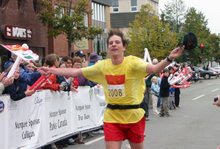A tale of two Olympians
The Guardian

The veteran and the rookie, experience versus enthusiasm. What’s a more appropriate sign of an athlete’s progression than that.
And it’s a homegrown scenario to watch this month at the 2008 Summer Olympic Games in Beijing, China, which started Friday and runs until August 24.
Kara Grant, who competes in modern pentathlon, is in her second Olympics. She’s the veteran. The Stratford native finished 22nd in Athens in 2004.
She competes Aug. 22 in her event — a punishing, one-day mix of running, horseback riding, shooting, swimming and fencing over the course of about five hours. Shooting? Swimming? Think it sounds easy? Try it.
Grant, now 28, did try it over a decade ago and after 12 years of international competition, the body is still eager. She’s coming off an eighth-place finish at the recent Paris Open in France and qualified for the Olympics in mid-June, a full month earlier than 2004.
“I feel great (a few) aches and pains that I’m taking care of. The training is going really well. I’m the fittest I’ve ever been,” said Grant in a recent interview from Quebec City.
“I didn’t have the same kind of pressure for qualifying. I felt that I was more established as an athlete and more of a consistent performer this time around, so going into the Games have a little bit different feel. I think I’m at the peak of my abilities.”
And so is the mind.
“There’s really only one answer to that, is there not?” she said, laughing. “Yes, I’m prepared for what’s ahead.”
Jared Connaughton is the rookie. The New Haven native hits the track Aug. 18 for the first heat in the 200-metre men’s sprint.
Launches might be more fittting as the 23-year-old ran a 10.15, 100-metre time earlier this spring in Texas. It was one of the fastest times for a Canadian this year. He’s also running in the 4x100-metre men’s relay which starts Aug. 21. He qualified for Beijing at the Canadian championships in July.
Connaughton admits, to his surprise, he’s relaxed before heading to Beijing on Monday. Maybe that has to do with the company he’s keeping while the national track team has been training in Singapore.
“(Two-time Olympian) Gary Reed, the Canadian 800-metre champion, and I were talking last night and it’s one of those events like no other. You go into the event knowing exactly who’s going to be there. There’s no questioning whether or not it’s going to be a fast meet, it’s the Olympics, you know,” said Connaughton from his hotel in Singapore on Thursday. “Often, I think, sometimes at a lower-calibre meet, you start getting into thinking strategic, sort of tactical things throughout the rounds, but Olympics it’s just live in the moment and really sort of warmup, call room, track, race and in that order. And if you keep it like that, you don’t overthink and I think overthinking really causes nervousness.”
Canada hasn’t won gold in men’s 200-metres since 1932, and since 1996 in the relay. While men’s modern pentathlon has been an Olympic sport since 1912, the women’s version wasn’t added until 2000. Canada has never won a medal. Monica Pinette’s 13th-place finish in Athens was the Canucks’ best result so far.
So the pressure’s on. Grant understands that. She’s seen her sport’s competitive edge sharpen since Athens, thanks to renewed interest and athletes learning the event at an earlier age.
“There are more athletes capable of medalling this time around. Last time there might have been a couple of favourites. I probably could have named you the people who won the actual medals before the event, but this time there’s probably at least half of the field that’s capable of medalling,” said Grant.
And, well, there’s always pressure for sprinters. One-hundred metres, 200-metres and relays are high-profile, flashy events filled with big personalities (think Ben Johnson, Michael Johnson or Donovan Bailey).
It’s also a field the poised Connaughton is comfortable running on, drawing peace from Beijing’s two-week, larger-than-life stage in a practice routine simulating race day at the track venue in National Stadium.
“It’s sort of a grand scheme of warmups. Waking up, eating, going to the track, going through security, settling down, warming up, going to the call room, going to the track, getting in the blocks, racing. You don’t get too far ahead.
“You’re not in the blocks thinking ‘oh, oh, if I run poorly the media is going to be mad at me’,” he said. “If you kind of ball all those 20 different steps up into this one looming craziness, it can get overwhelming. So I really try not to focus too much on any of them. You know, quick on my feet during interviews and things like that. I’m prepared for it, but I really don’t know yet. We’ll have to wait and see.”
As for Grant, who left Friday for training in Seoul, South Korea, before the Games, she’s counting on her Olympic and international experience to counter the bedlam.
“I’ve certainly tried to learn what I can from my last 10 years experience in terms of balancing my efforts, making sure I’m getting the most out of myself mentally and physically. Experience and competition and things that kind of add to your repertoire of things to draw on when you’re in certain situations,” she said.





























No comments:
Post a Comment